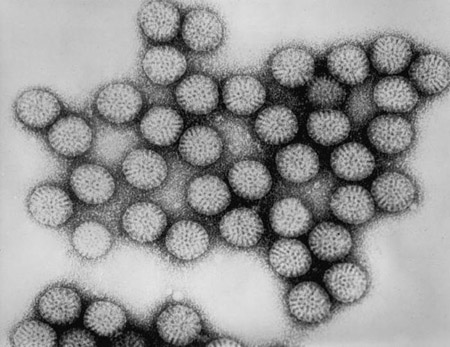შეჯამება
განსაზღვრება
ანამნეზი და გასინჯვა
ძირითადი დიაგნოსტიკური ფაქტორები
- რისკ-ფაქტორების არსებობა
- 5 წლამდე ასაკი
- ექსპოზიცია გასტროენტერიტის მქონე პირებზე
- აუცრელობა როტავირუსის წინააღმდეგ
- პირღებინება
- უსისხლო დიარეა
- ნაწლავის მომატებული ხმიანობა
სხვა დიაგნოსტიკური ფაქტორები
- მუცლის ტკივილი
- სუბფებრილური ცხელება
- დეჰიდრატაციის მტკიცებულება
- წონის კლება
- მუცელი გადაბერილი არ არის
- მუცლის ტკივილი
- ლორწო განავალში
რისკფაქტორები
- 5 წლამდე ასაკი
- ცუდი პირადი ჰიგიენა
- ექსპოზიცია გასტროენტერიტის მქონე პირებზე
- საბავშვო ბაღები
- ზამთრის თვეები
- სიღარიბე
- აუცრელობა როტავირუსის წინააღმდეგ
- ძუძუთი კვების ნაკლებობა
- იმუნოდეფიციტი
დიაგნოსტიკური კვლევები
1-ად შესაკვეთი გამოკვლევები
- კლინიკური გასინჯვა
გასათვალისწინებელი კვლევები
- შრატში ელექტროლიტები, შარდოვანა და კრეატინინი
- FBC
- სისხლის კულტურები
- განავლის მიკროსკოპია
- განავლის ბაქტერიოლოგიური ანალიზი
- იმუნოფერმენტული ანალიზი (EIA) ვირუსული ანტიგენის აღმოსაჩენად
- განავლის ელექტრონული მიკროსკოპია
მკურნალობის ალგორითმი
დეჰიდრატაციის გარეშე
მსუბუქი დეჰიდრატაცია (<5%)
საშუალო დეჰიდრატაცია (5% to 10%)
მძიმე დეჰიდრატაცია (>10%)
კონტრიბუტორები
ავტორები
Alexander K.C. Leung, MB BS, FRCPC, FRCP, FRCPCH, FAAP

Clinical Professor of Pediatrics
The University of Calgary
Calgary
Alberta
Canada
გაფრთხილება:
AKCL is an author of a guideline and a number of references cited in this topic.
რეცენზენტები
Saul Greenberg, MD
Associate Professor
Department of Paediatrics
University of Toronto
Ontario
Canada
გაფრთხილება:
SG declares that he has no competing interests.
Y.L. Lau, MBCBhB, MD, FRCP, FRCPCH, FRCPS, FHKAM, FHKCPaed
Professor
Faculty of Medicine
University of Hong Kong
Hong Kong
გაფრთხილება:
YLL declares that he has no competing interests.
რეცენზენტების განცხადებები
BMJ Best Practice-ის თემების განახლება სხვადასხვა პერიოდულობით ხდება მტკიცებულებებისა და რეკომენდაციების განვითარების შესაბამისად. ქვემოთ ჩამოთვლილმა რეცენზენტებმა თემის არსებობის მანძილზე კონტენტს ერთხელ მაინც გადახედეს.
გაფრთხილება
რეცენზენტების აფილიაციები და გაფრთხილებები მოცემულია გადახედვის მომენტისთვის.
წყაროები
ძირითადი სტატიები
Leung AK, Kellner JD, Davies HD. Rotavirus gastroenteritis. Adv Ther. 2005 Sep-Oct;22(5):476-87. აბსტრაქტი
Cortese MM, Parashar UD; Centers for Disease Control and Prevention. Prevention of rotavirus gastroenteritis among infants and children: recommendations of the Advisory Committee on Immunization Practices (ACIP). MMWR Recomm Rep. 2009 Feb 6;58(RR-2):1-25.სრული ტექსტი აბსტრაქტი
Le Saux N; Canadian Pediatric Society. Position statement: recommendations for the use of rotavirus vaccines in infants. Oct 2018 [internet publication].სრული ტექსტი
Leung A, Prince T; Canadian Paediatric Society. Oral rehydration therapy and early refeeding in the management of childhood gastroenteritis. Paediatr Child Health. 2006 Nov;11(8):527-31.სრული ტექსტი
Carter B, Fedorowicz Z. Antiemetic treatment for acute gastroenteritis in children: an updated Cochrane systematic review with meta-analysis and mixed treatment comparison in a Bayesian framework. BMJ Open. 2012 Jul 19;2(4):e000622.სრული ტექსტი აბსტრაქტი
გამოყენებული სტატიები
ამ თემაში მოხსენიებული წყაროების სრული სია ხელმისაწვდომია მომხმარებლებისთვის, რომლებსაც აქვთ წვდომა BMJ Best Practice-ის ყველა ნაწილზე.
ამ მასალის გამოყენება ექვემდებარება ჩვენს განცხადებას

